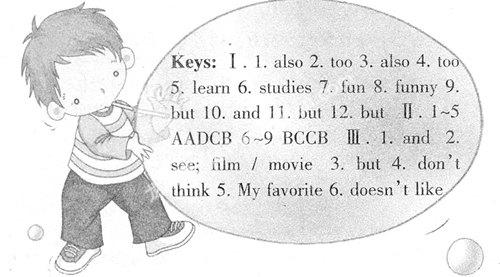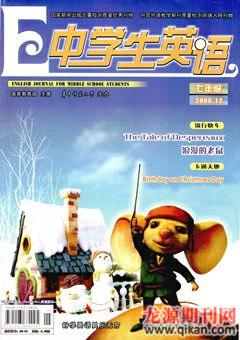新目标英语七年级(上)Unit 9重难点精讲精练
曹 梦
问 Do you want to go to a movie?中的go to a movie怎样理解?
答 go to a movie意为“去看电影”,相同意思的表达还有go to the cinema,go to see a film。film(英式英语)和movie(美式英语)意思相同,都是指“电影”。
问 What kind of movies do you like?中的of可以去掉吗?
答 不行。kind在此表示“种类”,是可数名词,常与介词of连用,构成“kind of+名词”短语。需要注意的是:kind短语作主语时,其谓语动词一般与kind的单、复数保持一致,而不是与其后的名词一致。例如:
There are many kinds of food in the kitchen. 厨房里有许多种食物。
问 Maria likes thrillers but she doesnt like comedies.中的like为什么前后不一样呢?
答 第一个like是一般现在时第三人称单数的肯定形式。第二个like没有加-s,是因为这是一个否定句。第三人称单数形式的否定句式是:主语+doesnt +动词原形+其他。如果把He likes bananas.变为疑问句和否定句分别就是:Does he like bananas?和He doesnt like bananas.
问 She thinks they are very exciting.中的动词think后面为什么不用宾格them,而用主格they呢?
答 先来看这个句子的结构,she为主语,thinks是谓语动词。they are very exciting是宾语从句,而它本身又是一个句子。在这个由句子充当的宾语从句中,they是这个句子的主语,所以不可用宾格。例如:
I think Deng Yaping is our favorite player. 我认为邓亚萍是我们最喜爱的运动员。
注意:当think后的句子表示否定意义时,习惯上要把not放在think之前。如问句中这句话的否定句就是:She doesnt think they are exciting.
问 I like thrillers and I like action movies. 和I like thrillers but I dont like comedies.中为什么第一句用and,而第二句用but?
答 这两个句子都是并列句。如果一个句子中包含两个或两个以上的简单句,我们称它为并列句。并列句通常用并列连词(and, but等)来连接。and在语意上表“顺接”;but在语意上表“转折”。例如:
I like ice cream and I like juice. 我喜欢冰淇淋和果汁。
He likes hamburgers but he doesnt like French fries. 他喜欢汉堡包,但他不喜欢炸薯条。
问 She often goes to see Beijing Opera with her father. 中出现了介词with,请讲讲with的用法好吗?
答 好的。介词with在英语中使用范围很广,意思也有很多,此句中的with意为“和……在一起”。with sb.意为“和某人一起”,一般在句中充当状语,既可位于句末,也可位于主语之后,但谓语动词的单复数形式始终要与句子的主语在人称和数上保持一致。例如:
She with her mother often goes shopping on Sundays. 星期天她经常和她妈妈一起去购物。
I often play with my friends. 我经常和我的朋友们一起玩。
介词with还有以下用法。
1. 表示“具有;带有”。例如:
This is a book with red cover. 这是一本有着红色封面的书。
Jane is a girl with long blond hair. 简是一个有着金色长发的女孩。
2. 表示“以……方式;用”。例如:
We eat with chopsticks. 我们用筷子吃饭。
Cut it open with the knife. 用这把小刀把它切开。
3. 表示“对于;关于;至于”。常常用在词组中。例如:
Be careful with the glass. 小心玻璃。
问 also, too两个词都有“也”的意思,请讲讲它们之间的区别好吗?
答 好的!两者都是副词,also用法比较正式,在口语中不常用,一般只用于肯定句中,有强调的意味,常位于主语和谓语之间,即实义动词之前,系动词、助动词之后;too一般只用于肯定句,通常置于句末,有时也可插到句中间。例如:
They also like playing volleyball. 他们也喜欢打排球。
He is also a student. 他也是一个学生。
I can also do it. 我也能做。
Im fine, too. 我也很好。
He likes comedies, too. 他也喜欢喜剧。
问 请问study与learn之间有何区别?
答 study指高级阶段的学习,因而又作“研究”讲;learn则指低级阶段的学习,且带有自学的含义。例如:
Do you study English? (以问大学生为好)
Do you learn English? (以问中小学生为好)
另外,study指主观上努力学习的动作,即“(努力)学习”;而learn则强调学习的结果,即“学会”。例如:
He studies hard and at last learns the lesson. 他努力学习,终于学会了这一课。
问 请问fun与funny有何区别?
答 fun作形容词时意为“有趣的;令人愉快的”,多用于口语中。fun也可作不可数名词,意为“乐趣,有趣(开心)的事情”。例如:
Seeing movies is fun. 看电影很有趣。
We had great fun at the party. 我们在聚会上玩得很愉快。
funny作形容词,意为“滑稽的;有趣的;好玩的”,在句中既可位于系动词之后作表语,也可位于名词之前作定语。例如:
The story is very funny. 这个故事很滑稽。
It is a funny story. 这是一个滑稽的故事。
问 本单元我们接触了favorite这个单词,请讲讲它的用法好吗?
答 好的。favorite作形容词时,意为“最喜爱的”。例如:
Who is your favorite teacher? 你最喜欢的老师是谁?
favorite作名词时,意为“最喜爱的人或物”,此时为可数名词,有单复数形式。例如: She is her mothers favorite. 她是她妈妈最喜爱的孩子。
This movie is my favorite. 这部电影是我最喜爱的。
These CDs are my favorites. 这些CD是我最喜欢的。
注意:favorite本身已含有比较之意,相当于like ... best,有时两者可互换使用。
小试牛刀
Ⅰ. 选词填空。
A. also / too
1. He ______ wants to go to a movie.
2. He can speak English, and he can speak Chinese, ______.
3. You need a pencil, and you ______ need an eraser.
4. This movie is a comedy, ______.
B. study / learn
5. She wants to ______ about it.
6. He ______ hard and all the students like him.
C. fun / funny
7. She has great ______ at the party.
8. She is a ______ girl.
D. and / but
9. The movie is scary ______ interesting.
10. I like China ______ Chinese people.
11. He likes apples ______ he doesnt like bananas.
12. He likes England ______ he doesnt like English food.
Ⅱ. 选择填空。
( )1. Maria likes apples. I like apples,______.
A. too B. also C. and D. with
( )2. She likes action movies and she______ likes thrillers.
A. also B. too C. and D. or
( )3. I like English ______ I like Chinese.
A. also B. or C. but D. and
( )4. Do you often play soccer ______ your friends?
A. to B. by C. with D. for
( )5. Please come ______ me.
A. on B. with C. to D. at
( )6. —I ______ the movie ______ inter-esting.
—But I like it.
A. think; is B. dont think; is
C. think; isnt D. dont think; isnt
( )7. Tom has a collection of all (全部的;所有的) ______ balls.
A. kind B. kind of
C. kinds of D. kinds
( )8. My brother likes thrillers ______ I thinktheyre scary.
A. and B. or C. but D. so
( )9. I have a cat and a dog. They are my______.
A. favorite B. favorites
C. a favorite D. favorite food
Ⅲ. 句型转换。
1. I like comedies. I like Beijing Opera, too.(将两句合成一句)
I like comedies ______ I like Beijing Opera.
2. I want to go to a movie. (改为同义句)
I want to go to ______ a ______.
3. I have a pen. I dont have an eraser. (将两句合成一句)
I have a pen ______ I dont have an eraser.
4. I think Beijing Opera is boring. (改为否定句)
I ______ ______ Beijing Opera is boring.
5. I like the actor Paul Jackson best. (改为同义句)
______ ______ actor is Paul Jackson.
6. Tony likes Shaolin Temple. (改为否定句)
Tony ______ ______ Shaolin Temple.


